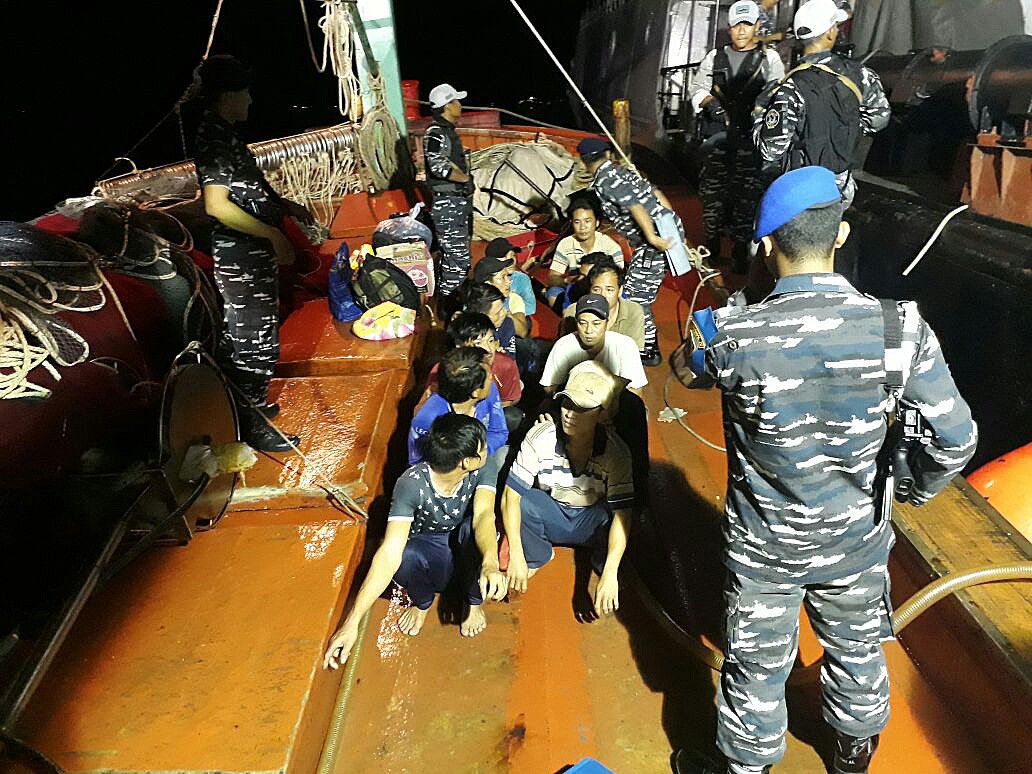Popular Reads
Top Results
Can't find what you're looking for?
View all search resultsPopular Reads
Top Results
Can't find what you're looking for?
View all search resultsHot pursuit cooperation to deter illegal fishing
Change text size
Gift Premium Articles
to Anyone
T
he Regional Plan of Action to Promote Responsible Fishing Practices including Combating Illegal, Unreported and Unregulated Fishing in the Region (RPOA IUU) concluded its latest meeting in Yogyakarta last November with a significant achievement. The resolution to take action against vessels without nationality has been finally agreed upon, concluding negotiations since 2016.
Some members, however, have reported difficulty in securing their Exclusive Economic Zone (EEZ) from foreign-flagged poachers. This serious issue is also relevant for each member, including Indonesia.
Indonesia’s vast waters, as well as the region, are still prone to illegal fishing by foreigners due to abundant fish stocks and unsettled maritime boundaries. Thus, more practical arrangements in this regional cooperation are needed, mainly in cooperation in exercising hot pursuit.
Why do we need to deter illegal fishing with collaborative hot pursuit? The answer is because the legal requirements of hot pursuit provide many opportunities for illegal fishing vessels to evade law enforcement by the coastal state’s patrol vessels. Therefore, each member would likely require assistance from other members to undertake hot pursuit successfully.
The right of hot pursuit according to Article 111 of the United Nations Convention on the Law of the Sea (UNCLOS) is the right of a coastal state to extend enforcement to the high seas or even other states’ exclusive economic zones (EEZ) over foreign vessels committing crimes in waters under the national jurisdiction.
Several legal and practical steps, as well as precautions, must be applied in exercising hot pursuit legitimately.
Firstly according to Article 111, we should have “good reason to believe” that a foreign vessel has contravened our laws and regulations. Regarding fisheries, this means we would have sufficient proof that such foreign vessel has conducted illegal fishing either in our internal water, archipelagic water, territorial sea or in EEZ.
For Indonesian officers, determining illegal fishing by the foreign vessel is uncomplicated as we do not give fishing access for foreigners within our EEZ. Hence, any foreign boat setting its fishing gear underwater must be deemed illegal fishing.
Secondly, in starting hot pursuit, both the pursuing vessel and the suspect vessel must be within the national maritime zones. Furthermore, hot pursuit can be lawfully commenced after the officer ensures that a visual or auditory signal to stop has been seen or heard by the suspect vessel.
One legal requirement is that the pursuit cannot be interrupted. The pursuit can only be undertaken by the main pursuing vessel or its boat or other craft (usually a helicopter) working as a team. Intercepting with other patrol vessel or craft which arrives later from a different direction is considered an interruption.
This provision might be a challenge as the pursuing vessel may chase its target far away to the high seas. Hence, the coastal state may need technical assistance, such as intelligence assistance and logistic support from their nearest members.
Article 111 asserts pursuit must be terminated once the fleeing vessel enters its own or other state’s territorial sea. This provision could be a severe impediment as some areas in Indonesia are close to its neighbors. Thus, illegal fishing vessels could easily escape by claiming the right of innocent passage within the territorial sea of other states.
Many legal scholars believe the entry of the pursued vessel into the territorial sea with intention to evade the law is considered a non-innocent passage.
One strategy to solve this issue is seeking assistance from neighboring countries to repel the fleeing vessel from their territorial seas. Therefore, Indonesia should initiate this practical arrangement within the RPOA-IUU.
We can learn from Australia which undertook a 21-day hot pursuit over Viarsa 1 for 3,900 nautical miles in 2003 and a 14-day hot pursuit over South Tomi for 3,300 nautical miles in 2001 successfully. These pursuits, arguably the two longest hot pursuits in recent history, involved the United Kingdom and South Africa in boarding and arresting the pursued vessels.
Alternatively, we can follow the sub-regional cooperation of the Western Africa nations that enables involvement among members to arrest a pursued vessel with a country flag which is not party to this agreement.
With the core objective of RPOA-IUU to address IUU fishing within the region, assisting members can agree on technical arrangements while exercising hot pursuit. This arrangement is paramount to improve mutual understanding among members and to secure the region from illegal fishing.
***
The writer is a fisheries inspector at the Marine Affairs and Fisheries Ministry. He graduated from the Master of Fisheries Policy program at the University of Wollongong, Australia. The above views are personal.











